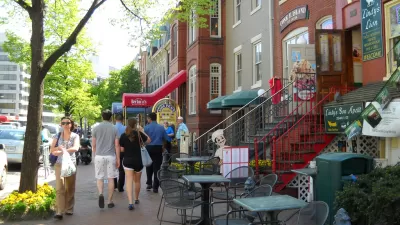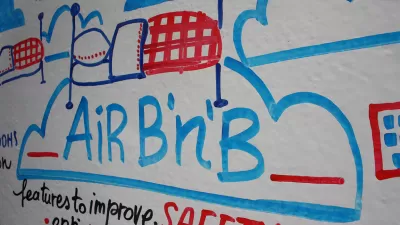An estimated 80-90 percent of short-term rentals could be outlawed if a proposed bill passes in Washington, D.C.

The DC Chief Financial Officer has released a report that sheds new light on the details of a preliminary bill, first released in January 2017, to limit short-term rentals in Washington, D.C.
David Alpert reports that the DC Chief Financial Officer has found that the bill is far more expansive than many observers realized. "[A]ctually, it turns out, this bill will outlaw 80-90% of all short-term rentals, even for people who are renting a room in their house when home or for only a small percentage of time when away," according to Alpert.
Those expansive powers come from a provision in the bill that would enforce current city law requiring short-term rental owners to get a permit in residential areas. Alpert explains:
This provision is actually just reinforcing the current law. Right now, most Airbnb rentals are not actually legal. Many people didn't know. This provision has not been enforced, and mostly not enforceable since the government isn't tracking who is renting through Airbnb. The bill will change that.
According to Alpert, city staff hadn't necessarily intended all the effects of the proposed bill described by the Chief Financial Officer's report. The CFO also found that the bill would reduce revenue to the District, so it's possible this version of bill is bound for revisions, or perhaps even failure.
FULL STORY: DC’s new Airbnb bill will prohibit far more rentals than its proponents thought

Alabama: Trump Terminates Settlements for Black Communities Harmed By Raw Sewage
Trump deemed the landmark civil rights agreement “illegal DEI and environmental justice policy.”

Planetizen Federal Action Tracker
A weekly monitor of how Trump’s orders and actions are impacting planners and planning in America.

The 120 Year Old Tiny Home Villages That Sheltered San Francisco’s Earthquake Refugees
More than a century ago, San Francisco mobilized to house thousands of residents displaced by the 1906 earthquake. Could their strategy offer a model for the present?

In Both Crashes and Crime, Public Transportation is Far Safer than Driving
Contrary to popular assumptions, public transportation has far lower crash and crime rates than automobile travel. For safer communities, improve and encourage transit travel.

Report: Zoning Reforms Should Complement Nashville’s Ambitious Transit Plan
Without reform, restrictive zoning codes will limit the impact of the city’s planned transit expansion and could exclude some of the residents who depend on transit the most.

Judge Orders Release of Frozen IRA, IIJA Funding
The decision is a victory for environmental groups who charged that freezing funds for critical infrastructure and disaster response programs caused “real and irreparable harm” to communities.
Urban Design for Planners 1: Software Tools
This six-course series explores essential urban design concepts using open source software and equips planners with the tools they need to participate fully in the urban design process.
Planning for Universal Design
Learn the tools for implementing Universal Design in planning regulations.
Clanton & Associates, Inc.
Jessamine County Fiscal Court
Institute for Housing and Urban Development Studies (IHS)
City of Grandview
Harvard GSD Executive Education
Toledo-Lucas County Plan Commissions
Salt Lake City
NYU Wagner Graduate School of Public Service





























